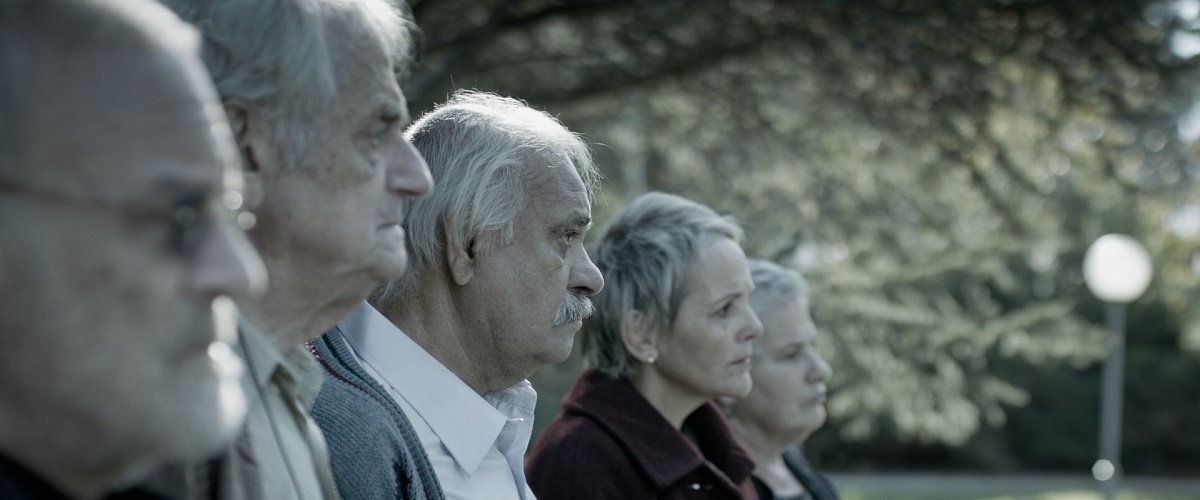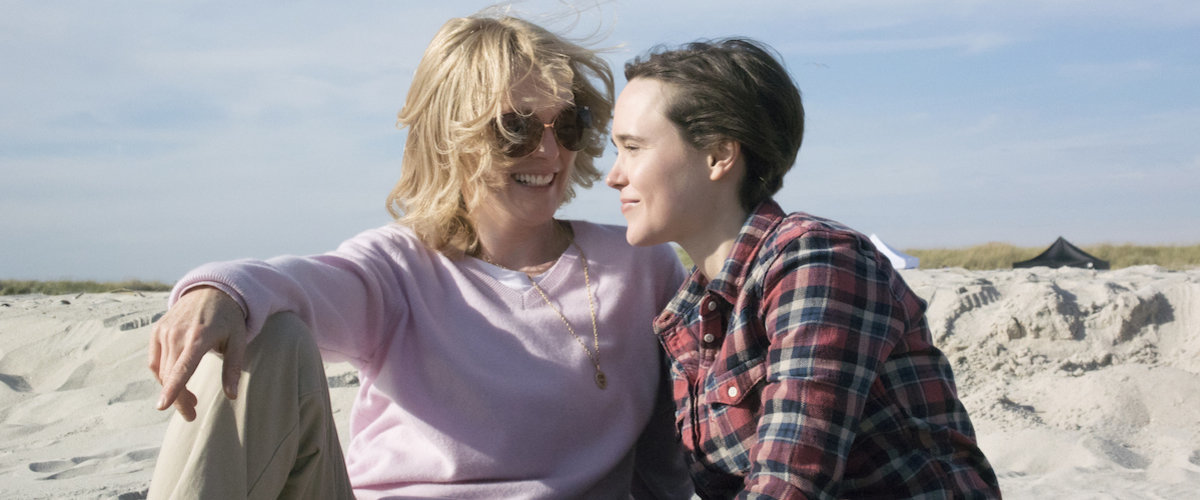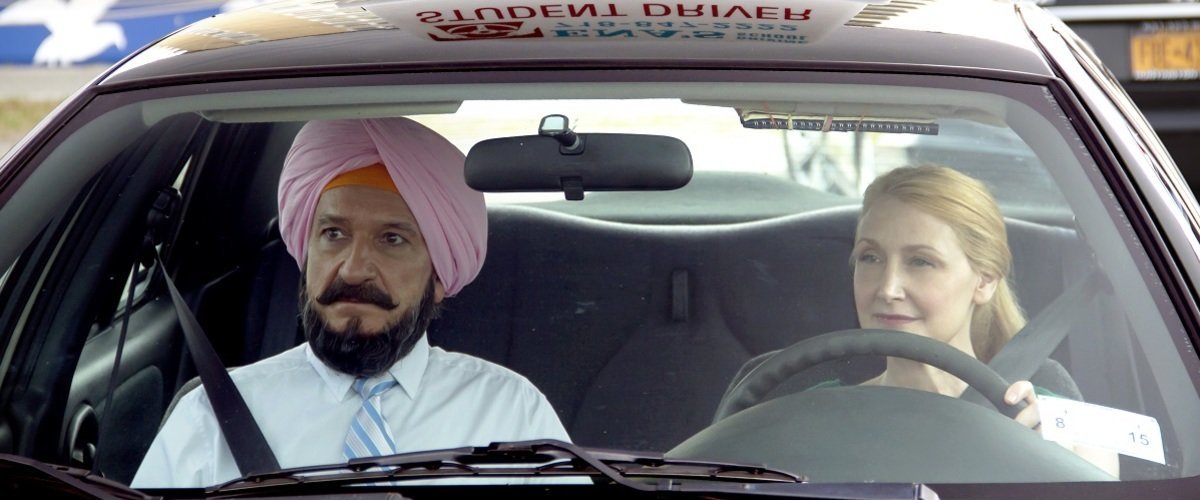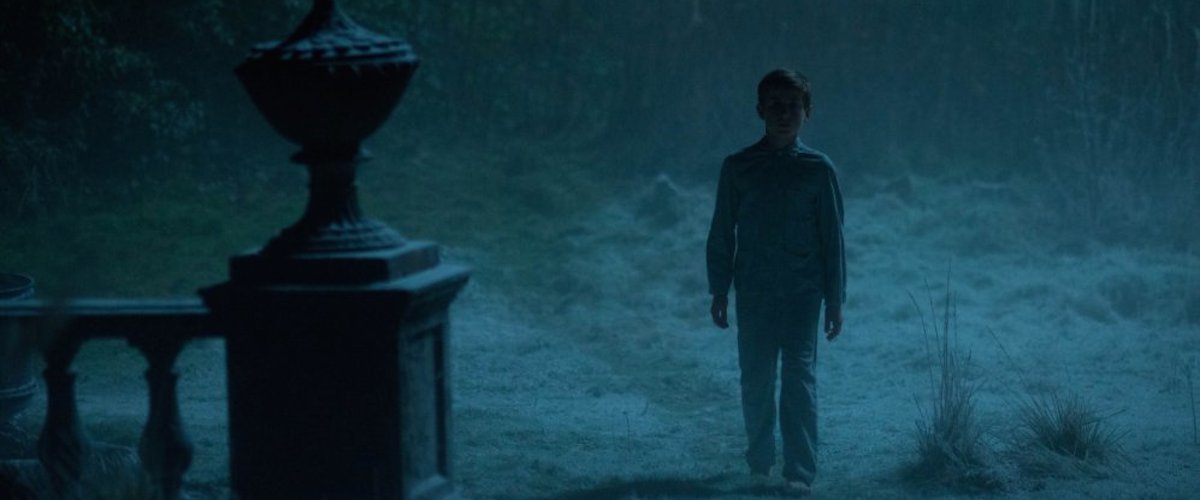
This series features the movie questionnaires and reviews from 2015 published by our site's regular film critics. We continue with critic Odie Henderson, who has reviewed such films as "The Farewell Party," "Furious 7," "'71" and "That Guy Dick Miller." His Twitter handle is @odienator.
QUESTIONNAIRE:
Where did you grow up, and what was it like?
I grew up in the Greenville section of Jersey City, New Jersey. The Hill, as we called it, was the ghetto. I lived in an especially rough patch of my 'hood, and I have the physical scars to prove it. Yet, while there was danger, there was also joy. I have such fond memories of my childhood and adolescence, and they peacefully co-exist with the bad memories to form my own personal narrative. The Hill was the box of crayons that colored, and continues to color, my worldview as a human being and as a writer.
Do you do any other jobs besides this one, and if so, what if anything did doing those jobs contribute to your sensibility as a moviegoer?
For the past 26 years, I have worked as a software engineer and programmer. Code writing is my primary source of income. I know 19 programming languages, and none of them affect my sensibility as a moviegoer. However, I do believe that my brain does not work in an artistic capacity; it works in a scientific capacity and that is reflected in my writing. There is an odd structure lurking beneath my words, to which I compulsively adhere. That's how my job interferes with my movie love. It's not while watching the movie. It's while I'm writing about it.
Was anyone else in your family into movies? If so, what effect did they have on your moviegoing tastes?
Both my sister and I inherited my mother's movie love. As the oldest, I got its greatest benefits. Mom had more time to watch old movies with me. She would explain who the actress or actor was, and tell me about the movie plot elements that might have gone over my head as a kid. Because of Mom, I love the old actors like Stanwyck, Cagney and Davis. Mom also loved scary movies and trash, and had little patience for pretentious art movies. My readers know I love trash more than Oscar the Grouch. Now you know where I got that affliction.
What's the first movie you remember seeing, and what impression did it make on you?
"The Exorcist." I thought it was HILARIOUS. I was 4. My opinion would change drastically later, once I understood the movie's topic.

What's the first movie that made you think, "Hey, some people made this. It didn't just exist. There's a human personality behind it."
"All That Jazz." I managed to get through "Jaws" and "Star Wars" without ever thinking about who made it. I saw "All That Jazz" on PBS when I was 11. This was the old PBS, so it ran uncut. I remember being completely frustrated by it, to the point I wanted to pull out my hair. But I couldn't stop watching, and it made me think about the person who made the film, and just how effed up he had to be. I started reading extensively about directors and writers after that.
What's the first movie you ever walked out of?
1982's "Cat People." I've walked out of 6 movies in my lifetime, and I went back to see 5 of those movies. I went back and saw "Cat People" later, and realized I'd made the right decision. It's not even good trash. My aversion to Nastassja Kinski, which I still have, began with "Tess" but was cemented here.
What's the funniest film you've ever seen?
"Blazing Saddles." However, "Coming to America" contained the biggest laugh I've ever had at a movie theater. You couldn't hear the dialogue in my theater for 5 minutes after that jHeri Curl activator stain in the couch scene. People were literally on the floor laughing, as was I.
What's the saddest film you've ever seen?
Douglas Sirk's version of "Imitation of Life." That funeral scene destroys me every time.
What's the scariest film you've ever seen?
You couldn't get me to watch "The Exorcist" now.
What's the most romantic film you've ever seen?
"Casablanca" is a great romance, and an even greater one once you realize the true love story is between Louis and Rick. But everybody who answers this questionnaire is going to say "Casablanca," so let me put in a vote for 1979's "A Little Romance." It's not a classic, and it has the "I'll do anything for money" version of Laurence Olivier that only I seem to love. But there's something so touching and sweet about these two kids who buy into this claptrap romantic notion of a special ritual that will bring about everlasting love. I first saw it when I was 30. By then, I'd become forever jaded about any aspect of romance, so my positive reaction to A Little Romance was a huge surprise. I rooted for these kids, and my cynicism temporarily melts whenever I watch it. "Moonrise Kingdom" reminded me of this film, though I've never warmed to the way Wes Anderson makes his child actors sound like 30 year olds visually shrunken by that machine in "Phantasm."
What's the first television show you ever saw that made you think television could be more than entertainment?
"Roots." I was traumatized by it, but I learned more than what they taught me during Black History Month in 1977 at my public grammar school.
What book do you think about or revisit the most?
There are three: "The Great Gatsby," "The Autobiography of Malcolm X," and "Inside Oscar." This should tell you all you need to know about my personality.
What album or recording artist have you listened to the most, and why?
I love Stevie Wonder (Springsteen would be my second choice). Stevie is a musical genius, which means when he makes a bad song, it's as if an angry bee on crystal meth flew into your ear. Thankfully, bad Stevie songs are few. I have every one of his albums and I never tire of listening to him.

Is there a movie that you think is great, or powerful, or perfect, but that you never especially want to see again, and why?
Lynne Littman's "Testament." 1983 was a tale of 2 nuclear holocaust movies. On TV, we had ABC's "The Day After," which had no affect on 13-year old me whatsoever. It looked like a Syfy movie. "Testament," which my 12th grade psychology teacher made us watch in 1986, focused on what happened to a family after the bomb. Jane Alexander was great as the matriarch who has to bury her kids as they succumb to radiation poisoning. It ends ambiguously, and when it was over, my entire class was speechless. I was profoundly moved and shaken by it, and I said to myself "this is a great movie, but I never want to see this again." I still haven't. Of course, I HAVE revisited "The Day After," because it's trash.
What movie have you seen more times than any other?
It's a toss-up between "Blazing Saddles" and "Coming to America."
What was your first R-rated movie, and did you like it?
"The Exorcist" was technically my first R-rated movie, but I'll choose the first time I was conscious of the rating and its delicious implications. That would have been a 1976 grindhouse double feature of Pam Grier's "Coffy" and "Foxy Brown." I liked them quite a bit.
What's the most visually beautiful film you've ever seen?
That's a hard one. Maybe Malick's "Days of Heaven" or Martin Ritt's "Sounder."
Who are your favorite leading men, past and present?
Past: Robert Mitchum and Jimmy Cagney. Present: Jack Nicholson and Denzel Washington
Who are your favorite leading ladies, past and present?
Past: Barbara Stanwyck, Bette Davis, and Joan "Wire Hanger" Crawford. Present: Taraji P. Henson, Regina King, Viola Davis, all of whom don't work enough in this business.
Who's your favorite modern filmmaker?
By "modern" I'll assume you mean "still working." Marty, Spielberg and Spike top my list, even though they've all been trying my patience lately.
Who's your least favorite modern filmmaker?
Anybody who has anything to do with the "mumblecore" genre.
What film do you love that most people seem to hate?
Brian DePalma's "Wise Guys." It's a Joisey movie, and I'm from Noo Joisey, so I think it's great. Even diehard BDP fans won't defend it.
What film do you hate that most people love?
"2001: A Space Odyssey," though every 10 years, I watch it again to see if my opinion changes. The last time was in 2012, when it played a midnight screening here in NYC. A couple sat next to me, and the male half was ecstatic about seeing the film. He rambled on to me for about 10 minutes about Kubrick's genius, trying to convince me that I was wrong to dislike "2001." This guy fell asleep 15 minutes in, and remained happily snoring until the lights came up. So I sat next to a physical embodiment of my opinion of "2001."

Tell me about a moviegoing experience you will never forget—not just because of the movie, but because of the circumstances in which you saw it.
My "Dressed to Kill" story has too much profanity, so I'll tell another one. By 1980, I was allowed to attend movies without adult supervision. My cousins and I went every weekend. We were all around 10 years old, which meant R-rated movies were verboten. Theaters used to enforce the ratings, and I remember the mean ticket booth lady whom we could never convince we were 17. So from ages 10 to 15, I became very adept at sneaking into R-rated movies. "The Blues Brothers" was the first time I did that, and the sense that I was getting away with something naughty hung over the entire screening. There was fear of being caught, but there was also unbridled exaltation over the car chases and musical numbers depicted onscreen. My cousins and I sat next to an older boy, and when the usher finally saw us and came to throw us out, we lied and said "we're with him!" Thankfully, the guy vouched for us. I still don't know why "The Blues Brothers" is rated R.
What aspect of modern theatrical moviegoing do you like least?
The fact that everybody wants to tweet or text during the movie. Even little old ladies, and they're the worst because their phone backlight brightness setting is Supernova. I also hate the damn commercials. Why did I pay $15 to see 17 TV commercials?
What aspect of moviegoing during your childhood do you miss the most?
I miss the old movie palaces. Granted, they were in disrepair by the time I got to them, but you could see remnants of their former beauty. Since they were usually 1-3 screens by the '70s, there was no movie sound bleeding from the next theater, and the huge screens still had curtains that opened before the film. It felt like an event whenever I went to these theaters. By comparison, the multiplex experience feels so artificial, so canned.
Have you ever damaged a friendship, or thought twice about a relationship, because you disagreed about whether a movie was good or bad?
NO! NO! NO!! I think this is pure arts major B.S., and I refuse any and all parts of it. I am sure people have ended friendships with me because of my movie tastes, and good riddance to them. Judging a person solely on their movie tastes is incredibly stupid. I know I'll get flak for saying this, but you should know how little I care about flak.
What movies have you dreamed about?
I only dream about horror movies. Once, my Mom turned into Freddy Krueger in a dream, then reverted back to her original self when she realized she could not beat my butt with her trademark belt if she had on Freddy's glove.
What concession stand item can you not live without?
I love Twizzlers. Not Red Vines. They're disgusting. Twizzlers.
REVIEWS:

The Black Panthers: Vanguard of the Revolution ***1/2
A river of protest soul music runs through the film, underscoring the visuals and influencing the smart editing choices by Aljernon Tunsil. He and [director Stanley] Nelson traverse a structured arc as if designing great drama, presenting a slew of talking heads, film clips and rarely seen photographs. The film avoids hagiography, and in doing so, brings out the undeniable humanity of its subjects.

Call Me Lucky ***1/2
“Call Me Lucky” will be an especially grueling ride for those who can identify with Crimmins’ trauma. Yet its toughness does not at all diminish its worth. It remains an essential viewing experience.

Champs **1/2
These are potentially fascinating and provable notions, yet “Champs” never fully coheres around either of them despite having details that would facilitate a more tightly executed treatise. It’s like a thesis whose next draft would be destined for greatness.

Cop Car ***
“Cop Car” gets in and out long before you have a chance to raise any objections. Instead, you'll walk out fully entertained, shaking your head in admiration at how the filmmakers pulled this off. This is one of the better genre offerings of 2015.

Do I Sound Gay? ***
Though we’re not given enough material to draw a solid theoretical conclusion about why someone would evaluate sexuality based on voice alone, the film still twists the viewer’s arm, forcing one to question one’s own ideas about whether the human voice has telltale signs. It also challenges your own thoughts about whether “sounding gay” is a bad thing in this day and age, and may even make you ponder the titular question for yourself.

Dope **1/2
“Dope” opts instead for Webster’s take on its title, defining it as slang for a stupid person, drugs and something that’s cool. To “Dope”’s credit, it presents us with credible examples of all three; to its detriment, “Dope” alternates between being shockingly tone-deaf and surprisingly on-point.

The Farewell Party ***1/2
It is, quite often, a very funny film, as mischievous as the youth that has long since left its characters, but not once does it treat its serious subject matter lightly. [...] Whether you agree with the decisions made by its terminally ill senior citizens, “The Farewell Party” loses none of its power.

Freeheld **
It feels uncomfortable to criticize a film with such noble intentions, and it’s even more disheartening when you share that film’s beliefs and politics. But “Freeheld” stumbles over too many hurdles to recommend it. The film’s heart is in the right place, but its focus is not.

Fresh Dressed **1/2
It primed me for a deeper discussion on how “clothes make the man,” then disappointed me by devolving into a huge commercial for fashion designers past and present.
Furious 7 ***1/2
“Furious 7” is a glorious overcompensation, a film so concerned about its rampant machismo that the casual viewer might miss how it Tokyo-drifts atop soap opera bubbles.

Gemma Bovary *1/2
Regardless of Joubert’s place in this “homage,” “Gemma Bovery” is all construction and snooty winks, no emotion. We really don’t care what happens to Gemma or anybody else, and making matters worse, the opening scene tells you of her fate so there’s no consideration that, like “Roxanne”, “Gemma Bovery” will shake its tragic underpinnings and surprise us.

Glass Chin ***
I admit the director’s vision took some getting used to, with its long takes and penchant for framing characters looking at the camera while talking to someone off-screen. However, once I acclimated to Buschel’s rhythms and became invested in the all-around solid acting by the cast, I found much to enjoy.

Robin Blotnick and Rachel Lears’ documentary stands on its own merit. It has a beautiful, low-key approach that earns its cheers and tears without resorting to the manipulative or dramatic tricks of a typical feature film.

In the Name of My Daughter **1/2
Those looking for a courtroom drama or the emotional tugging that might result from a mother’s 30-year fight to get justice for her daughter will find little to chew on here.

“Learning to Drive” proves that good acting can elevate even the most standard material. [Patricia] Clarkson makes Wendy more than a wronged wife; she has enough self-awareness to consider that she may not be completely blameless in her crumbling marriage. Her anger and melancholy are balanced with a dry wit that yields some big laughs.

Maggie **1/2
The actors are game for the ultimate heart of darkness of its scenario, that of a father possibly having to kill his own daughter, yet “Maggie” prefers to hide behind the heavy-handed symbolism of its visuals rather than deal with its tragedy head-on.

Marfa Girl 1/2*
This is a listless, uninspired piece of work whose most outrageous sexual material—toned down by [Larry] Clark’s standards—is no match in the offensiveness department for the scene where Marfa Girl (Drake Burnette) verbally dresses down a Mexican border patrol officer from her perch of privilege.

Meet the Patels ***
These are universal subjects, so one does not have to be of Indian descent to appreciate “Meet the Patels.” You’ll either learn something new or nod your head with amused familiarity.
Minions ***
The unquenchable desire to please emanating from the screen is, quite frankly, exhausting. “Minions” is a big, slobbery dog who licks your face, brings your slippers and humps your leg before turning into an adorable kitten with big eyes and a soulful mew. And, so help me, I couldn’t stay mad at it for long.

The Outrageous Sophie Tucker **
Director William Gazecki made a film that lacks any of the fascinating nuances, details and complexities of a life this richly lived. “The Outrageous Sophie Tucker” plays like a re-enactment of a Wikipedia page written by someone too terrified to delve below the surface of hagiography.

People Places Things **1/2
Writer-director James C. Strouse builds a lot up a lot of goodwill, even when his characters are intolerable, because he stays rooted in a recognizable, relatable reality. All that goodwill gets squandered with one of the limpest climaxes and endings I’ve seen in years.

[Dylan Thomas’s] work hasn’t been this trivially used since Disney replaced rap music with “Do not go gentle into that good night” in “Dangerous Minds” 20 years ago. Hell, Rodney Dangerfield’s “Back to School” has more Dylan Thomas verse than this film. What “Set Fire to the Stars” does have is great turns by supporting players, especially Shirley Henderson and Kevin Eldon.

’71 ***
Director Yann Demange’s feature film debut merges [Paul] Greengrass’ kinetic camerawork with [Jim] Sheridan’s character-driven drama; the result is a taut, suspenseful and involving feature that runs a tight 99 minutes.

The Squeeze *1/2
Here’s a movie that would benefit from being broken up by late-night television commercials. “The Squeeze” plays like something you’d stumble across on USA Network back in the days of “Up All Night.” All that’s missing is TV host Rhonda Shear and an ad for that spray paint-based fake hair in a can.
The Stanford Prison Experiment *1/2
A documentary about this could potentially be fascinating, as some of the actual experiment exists on film. Unfortunately, “The Stanford Prison Experiment” is a dramatization, and no matter how much it may adhere to the well-documented specifics of [Dr. Philip] Zimbardo’s work, it is a massive failure.

The filmmakers have made a fiercely political movie that’s an equally fierce “talk back to the screen”-style crowd-pleaser for folks eager to hear the tale of an influential rap group. “Straight Outta Compton” is a reminder that the biopic genre held the patent on the cinematic origin story long before the Marvel Universe; it plays like a Marvel superhero movie had Marvel been run by Suge Knight.

That Guy Dick Miller ***1/2
For a talking heads documentary, “That Guy Dick Miller” is extremely enjoyable, well-paced and informative. [...] Though clearly talented, Miller’s onscreen presence epitomizes what all those filmmakers, and all us fans, continue to want.

Wild Card **1/2
His fight scenes have their predictable, violent payoffs, but his rambling monologues are unexpectedly, gloriously entertaining. This film’s tagline should be “Come for the stabbing, stay for the gabbing!”

The Woman in Black 2: Angel of Death **
Bathed in silvery cinematography, with a heavy accent on shadow and darkness, “The Woman in Black 2” might have served as an effective tribute to movies like “Curse of the Cat People.” That is, if it hadn’t completely squandered all this goodwill in its last third.
Chaz is the CEO of several Ebert enterprises, including the President of The Ebert Company Ltd, and of Ebert Digital LLC, Publisher of RogerEbert.com, President of Ebert Productions and Chairman of the Board of The Roger and Chaz Ebert Foundation, and Co-Founder and Producer of Ebertfest, the film festival now in its 22nd year.





